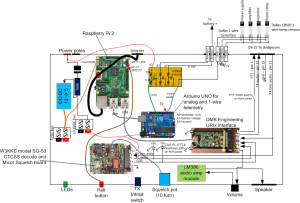Friday, June 10th, a newly packaged Raspberry Pi based repeater controller was installed on the 147.39 repeater, along with a squelch circuit based on the old but famous Motorola Micor squelch chip. This new package makes listening to the repeater a bit more pleasant. Strong signals will have little or no noise burst after they unkey, but the squelch will automatically slow down and loosen for weaker signals to prevent chopping their audio.
 Along with the new squelch circuit, the new controller package also has the ability to monitor voltages and temperatures at the repeater site and report those up to a computer that tracks the values over time.
Along with the new squelch circuit, the new controller package also has the ability to monitor voltages and temperatures at the repeater site and report those up to a computer that tracks the values over time.
Various circuits are connected together inside the controller cabinet, including (click the links for more information on the components):
- Raspberry Pi 2, which handles most of the repeater functions like courtesy tones, timers, identification, etc
- Model SO-50 Squelch and CTCSS board from W3KKC, based on the Motorola Micor squelch chip.
- URIx Radio Interface module from DMK Engineering
- Allstar software running on the Raspberry Pi from WA3DSP, KB4FXC and W0AMN.
- Arduino Uno board, which monitors power supply and battery voltages, along with various temperatures at the repeater site, then sends that data to the Raspberry Pi for processing
- Some wiring, customization, and poorly written scripts and code by N8CD
 All of the components are packaged into a re-purposed 19″ rack enclosure. This picture shows the inside of the enclosure before installation at the repeater site.
All of the components are packaged into a re-purposed 19″ rack enclosure. This picture shows the inside of the enclosure before installation at the repeater site.
 All of the components tie together to form a complete repeater controller that includes Allstar and Echolink connectivity.
All of the components tie together to form a complete repeater controller that includes Allstar and Echolink connectivity.
You can read more about the club’s 147.39 repeater under the “Club Repeaters” link at the top of the web site, and keep an eye on the club website for future articles about the repeater, it’s features, and what makes it all tick.
